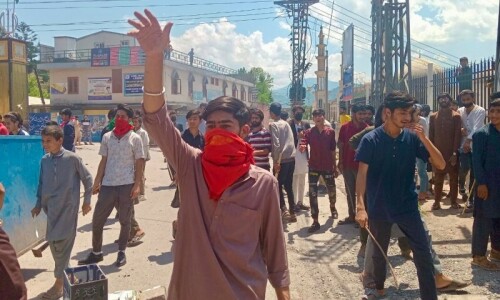
THATHI: Several days after reports of Ilyas Kashmiri’s death emerged, the militant commander’s family members say they know nothing about his fate and nor do the intelligence agents who visit them.
Thathi, the home village of Kashmiri, is an arduous six-hour drive from Islamabad, pushing ever higher into the foothills of the Himalayas, carpeted in lush grass but remote and depressingly poor.
Kashmiri’s family members say they have not seen him in six years. Nor has he sent money.
Elder brother Chaudhry Asghar speaks almost angrily about the burden of having to care for Kashmiri’s frail wife and four growing children.
“We don’t believe he’s dead,” said the 50-year-old, speaking at a village shop and refusing to let reporters visit Kashmiri’s house or meet the rest of the family until the situation becomes “clearer”.
But the humble mud building can be seen in the distance, sitting on the bank of a stream in front of a small mosque and madressah that Kashmiri built. It is here that his eldest son Khalid Ilyas, 18, daughter Maryam, 15, sons Osama 12 and Huzaifa, eight, live with their mother, not far from the Line of Control.
Thathi is a place where most people are poor, and depend on agriculture, including cattle. Others join the army and send their salaries home.
“We haven’t seen his body or any part of his body and unless we get some evidence we can’t accept he’s dead. We want concrete proof,” said Asghar. “So far we have no official confirmation of his death. Even intelligence officials have been coming, asking if we’ve received any information.
“We tell them we have no information... If he has been killed in jihad we’d appreciate it because it would be martyrdom.”
Years ago, Kashmiri used to visit once in a while, stay a couple of days and disappear. But Asghar has not seen his brother since 2005, when he got out of prison. The two argued and Kashmiri left.
“We told him to stop his activities and start family life. He didn’t agree. He insisted he’d fight US troops in Afghanistan,” says Asghar.
“I left the village, hoping he’d decide to stay. But he left anyway, telling his children `I must continue my mission`.”
He says Kashmiri never sent money to his family, who suffer as a result. “Sometimes they have to go to school hungry and weeping,” he said of his niece and nephews, while the militant’s sick wife looks old beyond her years.
But however upset he might be with his brother, Asghar cannot believe that he is guilty as charged of attacks on the military in Pakistan. “He told me he was dead against any terrorist act in Pakistan. He loved Pakistan and its army... He always said that he’d like his son to join the army as a commissioned officer.”
Schoolteacher Mohammed Razaq, 55, who says he taught maths to the teenage Kashmiri, remembers him as “an obedient student, a good athlete and an excellent debater” with an interest in politics. “But then he became interested in jihad.—AFP










































